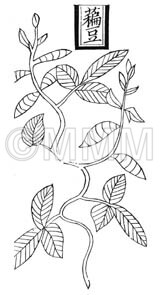Crude drug sample data base
※Click on the image to enlarge it.
The capital city, provincial capital city or the representative
location of its administrative area is indicated.
location of its administrative area is indicated.
22.7613207
121.14381520000006
Production area information
Taiwan,Taitung
https://ethmed.toyama-wakan.net/img/pin_san.png
22.5519759
120.5487597
Collection information
Taiwan,Pingtung
https://ethmed.toyama-wakan.net/img/pin_nyu.png
Scientific information data base
| Common name | 扁豆, Biandou, Dolichi Semen (JP18), Lablab Semen Album (CP2020), Dolichos Seed (JP18), White Hyacinth Bean (CP2020) | |||||
|---|---|---|---|---|---|---|
| Synonyms | 白扁豆 (Baibiandou) | |||||
| crude drug image |
| |||||
| Original plant name | Dolichos lablab Linn. (= Lablab purpureus (L.) Sweet), (Fujimame) | |||||
| Family name | Leguminosae | |||||
| Used part | mature seed | |||||
| Official compendium | JHMC (1989), JP XVIII, CP (2020 ed.) | |||||
| Clinical application | As a stomachic and antidote, biandou is applied for spleen and stomach weakness, diarrhea, vomiting and leukorrhea. It also detoxifies alcoholic and puffer fish poisoning. | |||||
| Medical system | Traditional Chinese medicine | |||||
| Drug effect in traditional medicine | Traditional classification | Drugs for replenishing Qi (vital energy) | ||||
| Beneficial effect | [Property and Flavor] Mild warm; sweet. [Meridian Tropism] Spleen and stomach meridians. [Actions] To fortify the spleen and resolve dampness, harmonize the middle and remove summer-heat. [Indications] Spleen-stomach weakness, anepithymia, sloppy stool, profuse white vaginal discharge, vomiting and diarrhea caused by summerheat-dampness, oppression in the chest and abdominal distension. | |||||
| Chemical constituent | Lipids (*C1): 脂肪 / fat Vitamin A derivatives (Retinoids) (*C1): ビタミンA様物質 / Vitamin A like substance Steroids (*C2): 6-Deoxodolichosterone, Dolichosterone, Homodolicholide (*C3): Homodolichosterone (*C4): Dolicholide Peptide (*C1): 蛋白質 / protein,Tyrosinase Others (*C1): 炭水化物 / carbohydrate,Ca, P, Fe | |||||
| Chemical structure |
※画像をクリックすると、拡大して表示されます。 | |||||
| Pharmacological effect | Liver necrosis, decrease in blood sugar and serum cholesterol. | |||||
| Classical reference (Chinese Herbal Classic "Zhenglei bencao") |  ※Click this image to see the actual image ※Click this image to see the actual image | |||||
| Disease | Full stomach, Abdominal pain, Diarrhea, Muddy and watery stool, Anorexia, Vomitting, Leukorrhea, Seafood poisoning, Fugu intoxication, Alcoholic intoxication | |||||
| Formulation | Jinryobyakujutsusan | |||||
| Related drugs | Dolichi Arillus, Dolichi Flos | |||||
| References | JP18: The 18th edition of the Japanese Pharmacopoeia. CP2020: Pharmacopoeia of the People's Republic of China 2020 edi. C1)The Encyclopedia of Wakan-Yaku with Color Pictures Vol. I, pp 213-214. C2)Agric. Biol. Chem., 47, 1409, 2149 (1983). C3)Agric. Biol. Chem., 48, 2529 (1984). C4)Tetrahedron Lett., 23, 4965 (1982). | |||||
| Remarks | Henzui (扁豆衣, Jap. name) is the seed coat of Fujimame (Dolichos lablab L.) and used like Biandou (扁豆). Henzuka (扁豆花, Jap. name) is the flower of Fujimame and used for diarrhea, concentrated blood, leukorrhea etc. The genus Lablab consists of one species, Lablab purpureus. Though it was classified into genus Dolichos in the past, now it is divided into another genus according to the the shape of style. Both the Japanese and Chinese Pharmacopoeia adopt the former nomenclature Dolichos lablab. | |||||
| Last renewal date | 2021/09/27 | |||||









